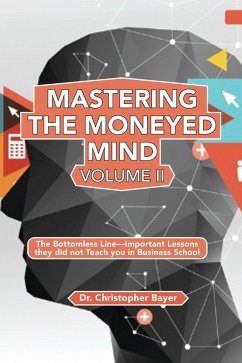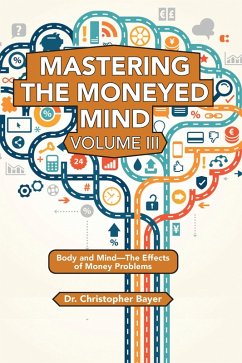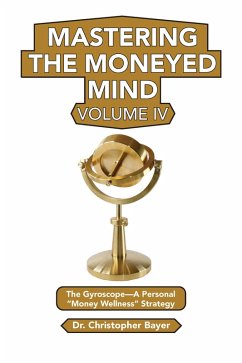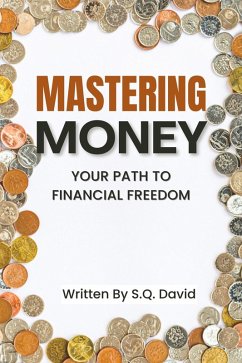
Mastering the Moneyed Mind, Volume II (eBook, ePUB)
The Bottomless Line-Important Lessons they did not Teach you inBusiness School
Versandkostenfrei!
Sofort per Download lieferbar
9,95 €
inkl. MwSt.
Weitere Ausgaben:

PAYBACK Punkte
5 °P sammeln!
The book is an exploration of how direct and indirect psychological conditioning eliminates morality from decision making in the world of finance.The Bottomless Line-Important Lessons They Did Not Teach You in Business School is the second book in a series about the psychology of money by Dr. Christopher A. Bayer, the Wall Street Psychologist. This book builds on the key concepts in the first volume, to draw the reader's attention to the "dark side" of the business world. Structured in a way that enables readers to examine contemporary examples of willful co-optation, misuse, and misinterpreta...
The book is an exploration of how direct and indirect psychological conditioning eliminates morality from decision making in the world of finance.
The Bottomless Line-Important Lessons They Did Not Teach You in Business School is the second book in a series about the psychology of money by Dr. Christopher A. Bayer, the Wall Street Psychologist. This book builds on the key concepts in the first volume, to draw the reader's attention to the "dark side" of the business world. Structured in a way that enables readers to examine contemporary examples of willful co-optation, misuse, and misinterpretation of old texts and ideas, run-of-the-mill corruption, and dangerous groupthink, the author examines the personal and broad- scale financial troubles generated by reckless financial misunderstandings.
The book is an exploration of how direct and indirect psychological conditioning eliminates morality from decision making in the world of finance. It provides evidence that ties systemic corruption on Wall Street to the lessons of the storied Milgram experiments (obedience, effects of perceived hierarchy and status, immoral actions-"just following orders"). In the end, readers are led to the "big takeaway": the need to cultivate and maintain a core of character in order to weather any ethical storm.
It also summarizes the history of financial psychopathy, details the rise and fall of a few notorious Wall Street perpetrators-from the brass at Enron to the infamous Bernard Madoff-and examines how their hardwired psychopathy leaves them bereft of moral qualities necessary to build a functioning and responsive moral compass of Gyroscope.
The Bottomless Line-Important Lessons They Did Not Teach You in Business School is the second book in a series about the psychology of money by Dr. Christopher A. Bayer, the Wall Street Psychologist. This book builds on the key concepts in the first volume, to draw the reader's attention to the "dark side" of the business world. Structured in a way that enables readers to examine contemporary examples of willful co-optation, misuse, and misinterpretation of old texts and ideas, run-of-the-mill corruption, and dangerous groupthink, the author examines the personal and broad- scale financial troubles generated by reckless financial misunderstandings.
The book is an exploration of how direct and indirect psychological conditioning eliminates morality from decision making in the world of finance. It provides evidence that ties systemic corruption on Wall Street to the lessons of the storied Milgram experiments (obedience, effects of perceived hierarchy and status, immoral actions-"just following orders"). In the end, readers are led to the "big takeaway": the need to cultivate and maintain a core of character in order to weather any ethical storm.
It also summarizes the history of financial psychopathy, details the rise and fall of a few notorious Wall Street perpetrators-from the brass at Enron to the infamous Bernard Madoff-and examines how their hardwired psychopathy leaves them bereft of moral qualities necessary to build a functioning and responsive moral compass of Gyroscope.
Dieser Download kann aus rechtlichen Gründen nur mit Rechnungsadresse in A, D ausgeliefert werden.













